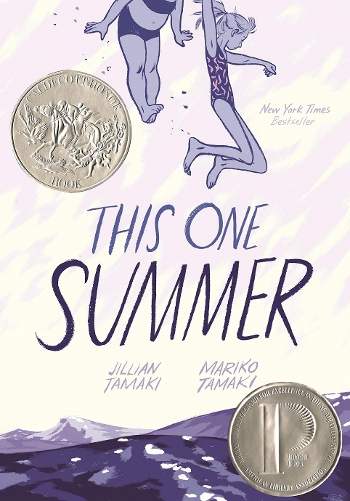If you pay attention to online chatter at all, you know that in recent years there have been debates over whether or not ALA should establish an award specifically for graphic novels and comics. There are strong feelings on both sides.
 I always look forward to reading here at Calling Caldecott about the graphic novels and comics that could bring home a Caldecott. Just next week we will hear from Alec Chunn and Niki Marion about the 2021 graphic novels that have grabbed their attention.
I always look forward to reading here at Calling Caldecott about the graphic novels and comics that could bring home a Caldecott. Just next week we will hear from Alec Chunn and Niki Marion about the 2021 graphic novels that have grabbed their attention.
We’ve seen graphic novels win some major ALA awards in recent years (a Coretta Scott King Award, a Sibert Award, and a YALSA Nonfiction Award for March by John Lewis, Andrew Aydin, and Nate Powell; multiple Printz awards for graphic novels; and even a graphic novel, New Kid by Jerry Craft, getting the Newbery Medal in 2020).
And in terms of Caldecott recognition, This One Summer garnered a Caldecott Honor for Jillian Tamaki in 2015. It blows my mind to think about the committee comparing a graphic novel to a traditional picture book, and I’d love to be a fly on the wall for those conversations. This One Summer is the one and only Caldecott nod to a graphic novel in the award’s 83-year history, but could that change soon? We are undoubtedly living in a golden age of sequential art and graphic storytelling.
If you pay attention to online chatter at all, then you know that in recent years there have been debates over whether or not ALA should establish an award specifically for graphic novels and comics, since currently none exists. There are strong feelings on both sides. You might encounter arguments that go a bit like this (and you will see much overlap in these arguments, despite my best attempts to delineate them):
The Proving-the-Naysayers-Right Argument: Some people altogether dismiss comics and graphic novels, claiming they are inferior to traditional books. (As noted in this 2019 Publishers Weekly piece about ALA’s then-new Graphic Novel and Comics Roundtable, comics were once seen as “a lowly, pulp art form,” and sometimes I meet people today who still adhere to such beliefs, as if we’re perpetually stuck in 1955.) Will dedicating an award to them encourage such disdain? Does the creation of an award for graphic novels communicate that they can’t exist in the same category as traditional books, as if to say they just don’t have the literary value to stand up to books that are not visual narratives?
Counter argument: Nope. An award just for graphic novels will, in fact, bring more legitimacy to the genre.
The Don’t "Sideline" Them Argument: Giving graphic novels their own award might prevent them from being considered for more mainstream awards, and winning such awards will help the public become more accepting of the medium. (Think of Gene Luen Yang’s American Born Chinese receiving the 2007 Printz Award, not to mention the big 2020 Newbery win with New Kid.) In 2001, Marc Aronson wrote in the Horn Book about the dangers of “proliferating prizes.” Using the Coretta Scott King Book Awards as an example, he wrote: “There is less pressure on the general population to read, understand, appreciate, and develop a fine critical eye for African-American literature if a librarian can always think, ‘I don’t have to read those books carefully. The Coretta Scott King Award takes care of that.’" (No lesser persons than Andrea Davis Pinkney, Virginia Hamilton, and Rudine Sims Bishop responded to this essay with strong rebuttals: “Multiculturalism is in no way a balkanization of art and literature,” wrote Hamilton. And for the record, Aronson noted in 2016 that he still revisits what he wrote, “turning over [his] own conclusions” — and that he believes that bringing “more voices and perspectives into literature is important.”)
Counter argument: These types of awards can bring much-needed recognition to particular cultures, perspectives, and (in the case of graphic novels) mediums. And more awards can enrich the literary scene and spotlight diversity (on many levels) in ways we haven’t seen before — in this instance, shining a spotlight on graphic narratives.
More awards also mean more attention brought to more books. (This is the-more-the-merrier rebuttal!) Also, a book can always be considered for more than one award (such as the Caldecott and the Pura Belpré Award, or even the Caldecott and the Newbery).
The Enough Already! Argument: Come on. We’re all going to get awards fatigue. If we are inundated with awards, will they all stop meaning anything?
Counter argument: Once again, for those in the back, more awards mean more attention brought to more books. Plus, more awards mean more sales, which means the publishing industry will thrive.
What do you think? Did we miss any arguments? Do you see value in the creation of a new ALA award that is entirely devoted to graphic stories?
Meanwhile, be sure to look out for Alec and Niki's post on Caldecott-eligible graphic novels next week.

ALREADY A SUBSCRIBER? LOG IN
We are currently offering this content for free. Sign up now to activate your personal profile, where you can save articles for future viewing.








Add Comment :-
Comment Policy:
Comment should not be empty !!!
Alissa Browning-Couch
I would love to see a graphic novel award! I think it would build more respect for the art form, which would probably make graphic novels more likely to be noticed for awards like Caldecott and Newbery. From a librarian perspective, I also think it would be helpful to see which graphic novels were judged to be the best of the best each year, especially as they have quickly become the most in-demand materials at most libraries for children and young adults in recent years.Posted : Nov 22, 2021 02:48
Cheryl Mann
I feel that with the criteria for the Caldecott and the Newbery it often feels like we need to dismiss the parts that can make a graphic novel special. The careful mix of panels, the wedding of the graphics with the text, the way the art is put together, all of these are things that aren't always carefully considered when looking at the two major awards. I think graphic novels should have their own Award.Posted : Nov 19, 2021 03:02
Adrienne Pettinelli
I never know how to feel about this. There are so many awards, and I find that to be both a good and a bad thing. As a reader and librarian, because there are so many awards, I find myself at awards time with this wealth of books to look at, things I might have missed when they were originally published that I wind up loving. On a practical level, Newbery and Caldecott are the big money-makers for publishers and creators, and I fear that sometimes people on those committees may not push for excellent books that they believe are a perfect fit for this or that other award. Committees should be above this, but also committees are part of a world that does a lot of othering. On another practical level, though, the Newbery and Caldecott criteria were not written with comics and graphic novels in mind, and I think a lot of amazing graphic novels wind up not making the cut because they aren't great fits for the nitty gritty of the criteria. So not making the cut may not be about the overall quality of the work itself; it's about the fact that when you have twenty amazing books on a table and you have to knock some off, the nitty gritty of the awards criteria become very important. That said, I certainly believe that a graphic novel can be a Caldecott, and it makes me happy to see people still talking about This One Summer. Just looking at that cover makes me want to go flip through my own copy again--such a beautiful, beautiful book. So I don't know. I'm glad this is a decision I don't have to make.Posted : Nov 18, 2021 09:01
Sergio R.
Graphic novels (or comics) speak a different language than the picture book, and that makes me believe there should be a special award for them. Naturally, there are overlaps. But overlaps exist in all genres. Hugo Cabret was considered a picture book when it won the Caldecott, but it could have been considered a novel. In the Night Kitchen could have been considered a graphic novel (actually, that term didn't exist back in 1971...), but it won a Caldecott honor. There are picture books that could be considered eligible for the Geisel. I think all genres overlap, more or less, but comics (or graphic novels) should get their own award, and if one year the same book wins the Caldecott and the Newbery and the Geisel and the new comics award (the Eisner already exists, so how should they call it?), that will mean all juries thought that was the best book in all those categories.Posted : Nov 18, 2021 08:34